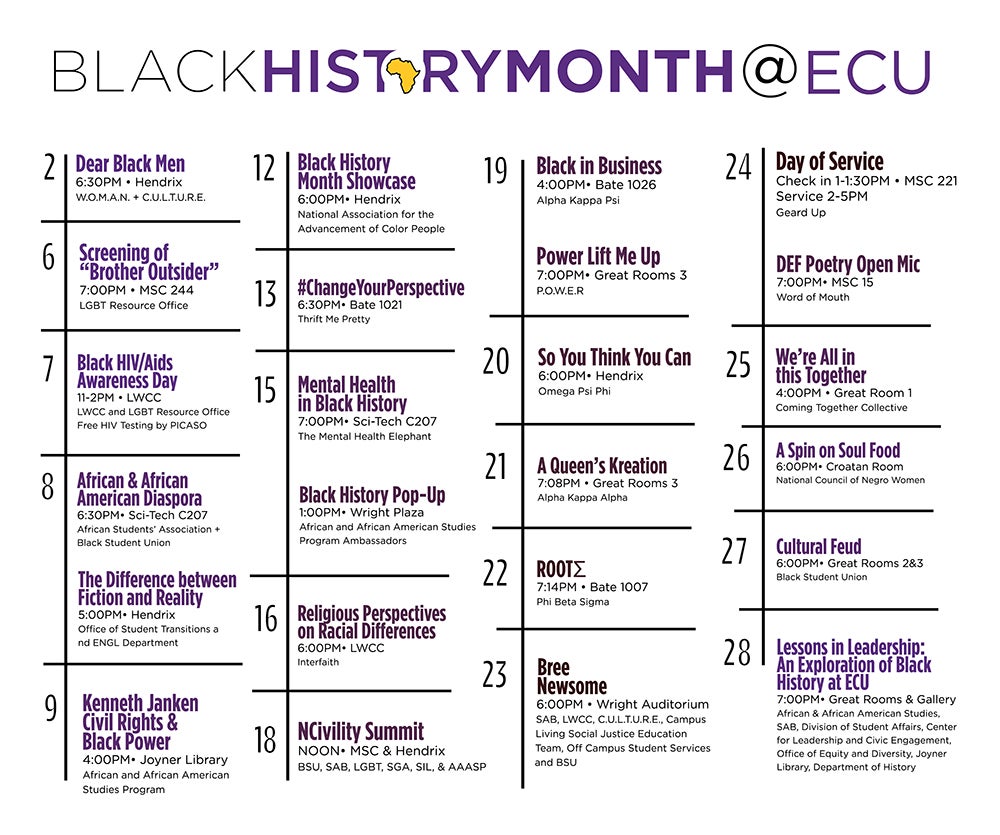February 15, 2017 Edition
Inside the Edition
Jump to story by clicking links below
2017 Spring Career Fairs – Call for Volunteers
New from the Dean of Students Office
ECU and Campus Living Leaders Featured
Greenville Fire and Rescue Training at CRW Facility
Upcoming Opportunities
Green Zone Training
Tuesday, March 14 from 3pm-5pm in Mendenhall Student Center, Room 221
Click here to register for sessions/trainings.
SA Continuing Career Development Program
Laughter, Meditation and Instant Recess: How to Mitigate Burnout on February 22, 2017 from 10am-11:30am in the Student Recreation Center, Room 202.
Click here to Register on Cornerstone.
SA Continuing Career Development Program
Empowering You to Become More Effective Communicators and Leaders on March 15, 2017 from 3pm-5pm in Mendenhall Student Center, Great Room 1.
Click here to Register on Cornerstone.
SA Continuing Career Development Program
Tour of the New Student Center on Health Sciences Campus on April 6, 2017 at 3pm and 4pm.
2017 Spring Career Fairs – Call for Volunteers
 The 2017 Education Career Fair and Spring Career Fair are right around the corner and Career Services is asking for your help this semester. This year’s events are being held on Wednesday, March 1, 2017 from 8:00am – 10:00am (Education) and 1:00pm – 4:00pm (Spring) at the Greenville Convention Center.On that day, over 250 employers will be at the Greenville Convention Center in hopes of recruiting the best and brightest students ECU has to offer. In order to make this day a success, Career Services need 85-100 volunteers to aide in staffing this event in several different capacities throughout the day.
The 2017 Education Career Fair and Spring Career Fair are right around the corner and Career Services is asking for your help this semester. This year’s events are being held on Wednesday, March 1, 2017 from 8:00am – 10:00am (Education) and 1:00pm – 4:00pm (Spring) at the Greenville Convention Center.On that day, over 250 employers will be at the Greenville Convention Center in hopes of recruiting the best and brightest students ECU has to offer. In order to make this day a success, Career Services need 85-100 volunteers to aide in staffing this event in several different capacities throughout the day.
Click here to sign-up and volunteer. Questions can be directed to Patrick Roberts at robertsp@ecu.edu
Kicks for a Cause
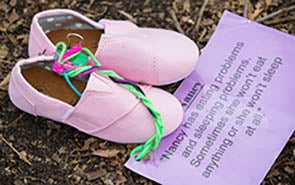 Students take a walk in others’ shoes
Students take a walk in others’ shoes
by Jules Norwood, ECU News ServicesEast Carolina University’s campus was filled with messages of positivity on Thursday, Feb. 9 as the SHOES project took over the Mall, campus buildings and buses.After receiving state, regional and national awards for last year’s inaugural event, SHOES — Students Honoring Others’ Everyday Struggles/Stories — returned this year to help ECU students who may be feeling isolated or dealing with challenging times.The event included hundreds of pairs of shoes attached to personal stories, Post-It Notes with uplifting messages, a Worthy Wall, Soks the giant purple bear and free hot cocoa and cookies.
Assessment Corner
 Featuring Dean of Students (DOS): Care Team and University Behavioral Concerns Team
Featuring Dean of Students (DOS): Care Team and University Behavioral Concerns Team
Assessment Method: Violence Risk Assessment and Tracking
Actions Taken Based on Results: Implementation of the DOS Intake Form, a new in-house, intake form to determine the main stressors impacting students and to assist the staff member in determining the best approach when working with each individual student.
Strategic Plan and Outcomes Connection: To contribute to maximizing student success through safety in the Student Affairs’ strategic plan, the Dean of Students office created a system that proactively responds to the campus community’s behavioral and safety concerns. The Care Team and University Behavioral Concerns Team (UBCT) offer responsive interventions to assist individuals in distress and connect them with the appropriate resources on or off campus. The Care Team focuses on cases that are lower risk and do not pose a threat to others, but could pose a threat to self. While UBCT responds to cases that are higher risk and pose a potential or imminent threat to self-and/or others.
Assessment: In the 2015-2016 academic year, the Dean of Students tracked the number of cases and continued to see an increase in the number of cases in their system. To determine the best action and to measure the change in behavior of each case, a home-grown risk rubric adapted from the WAVR-21 was used after reviewing the case at CARE meetings and then re-assessed a second time at the end of the academic term. The levels of risk included: Minimal Risk, Moderate Risk, and High Risk. The goal of the CARE Team and UBCT is to decrease the level of severity by one risk level. With this assessment, the CARE Team was able to provide evidence that initially 10% of their cases were at high risk but by the end of the term, only 2% were considered high risk. Similarly, the cases of moderate risk at the beginning of the semester were at 51% and dropped to 14% at the end of the semester. The cases on minimal risk increased, from 39% to 84%, because of cases dropping from the high and moderate risk category down to minimal risk. This data shows evidence of how the Dean of Students works toward the continuous improvement of the environment on campus and how the office works towards assuring the safety of the campus community.
2016-2017 Actions: To continue to improve their practices for the 2016-2017 academic year, the Dean of Students office has implemented a new intake assessment in order to determine the direct needs of and the best resources for each case. A student resilience self-assessment, CD-RISC, is given to students after they complete the new intake form and will be administered again via email at the end of the term. This will also assist the team in determining where students need assistance and education in resilience and coping skills.
In addition, CARE Team and UBCT now implement the NaBITA Threat Assessment Tool, a nationally ranked “best-practice” tool that provides the team with a clear description of each of the risk levels in order to improve rating consistency. UBCT is continuing to use the WAVR-21 to address the violent risk concerns.
For questions regarding the NaBITA Threat Assessment Tool and overall processes, please contact Patricia Barfield, barfieldp15@ecu.edu.
News from the Dean of Students Office
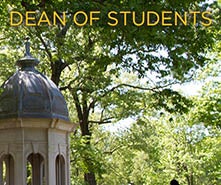 Tamika Wordlow, has been promoted to an Associate Dean of Students, Director of the Office of Student Rights and Responsibilities. Tamika began her tenure at East Carolina University in July 2012 when she joined the Office of Student Rights and Responsibilities as an Assistant Director and, in 2014, she became the Director of the office. Tamika serves on many committees at both the university and the national level. She is a member of UNC General Administration- Student Health and Wellness Committee, ACPA – Commission for Student Conduct and Legal Issues, and ASCA Diversity Committee. Tamika is a member of Phi Kappa Phi, Omicron Delta Kappa, and Alpha Kappa Alpha Sorority, Incorporated and is the 2016 recipient of the Student Affairs Integrity Award. Tamika’s leadership in administering and upholding the Student Code of Conduct and policies established by East Carolina University and the UNC System, while monitoring a proper balance between students’ rights and keeping a safe, orderly physical and social environment, have earned her the respect of her colleagues.
Tamika Wordlow, has been promoted to an Associate Dean of Students, Director of the Office of Student Rights and Responsibilities. Tamika began her tenure at East Carolina University in July 2012 when she joined the Office of Student Rights and Responsibilities as an Assistant Director and, in 2014, she became the Director of the office. Tamika serves on many committees at both the university and the national level. She is a member of UNC General Administration- Student Health and Wellness Committee, ACPA – Commission for Student Conduct and Legal Issues, and ASCA Diversity Committee. Tamika is a member of Phi Kappa Phi, Omicron Delta Kappa, and Alpha Kappa Alpha Sorority, Incorporated and is the 2016 recipient of the Student Affairs Integrity Award. Tamika’s leadership in administering and upholding the Student Code of Conduct and policies established by East Carolina University and the UNC System, while monitoring a proper balance between students’ rights and keeping a safe, orderly physical and social environment, have earned her the respect of her colleagues.- Patricia Barfield has been named Interim Assistant Dean of Students. Patricia began working in the Dean of Students Office in the fall of 2013 as a Graduate Assistant. Upon her graduation, Patricia accepted a position with Edgecombe Community College and served as a Title IX Investigator there. In 2015, Patricia accepted the East Carolina University Student Affairs Case Manager position in the Dean of Students Office. Patricia is a member of the CARE Team and the University Behavioral Concerns Team, covering both students and employees. Patricia holds a number of certifications: NaBITA Threat Assessment, ATIXA, Title IX Investigator, Mental Health First Aid Training, Stewards of Children (Sexual Abuse Recognition, Response, and Prevention), and Applied Suicide Intervention Training. Patricia is the recipient of the 2016 Division of Student Affairs Emerging Professional Award, East Carolina University Centennial Award for Excellence, ECU Care Team and the UNC staff Assembly Certificate of Appreciation.
- Mandy Messerli, Associate Director for the Office of Student Rights and Responsibilities presented at the Association for Student Conduct Administration (ASCA) on February 1-4 in Jacksonville, FL. The name of her presentation titled, Changes You’ll Experience with Your New Addition, focused on information that would have been helpful to know prior to having a child. Some of the information covered included insurance, daycare and bills!
2017 Family of the Year Award
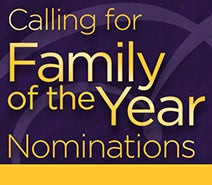 Nominate a deserving family for the “Family of the Year” award.
Nominate a deserving family for the “Family of the Year” award.
This award is intended to celebrate the supportive role parents and families play in the lives of students and the University community. Honoring outstanding parents/families helps remind the East Carolina University community that families are an essential part of the support network for our students.All families, parents or family members of current students are eligible for nomination regardless of alumni states or state of residence. Families may also self-nominate.
Nominations will be open through March 24.
Visit https://parents.ecu.edu/ for more information and nomination criteria.
Creed Award Nominations
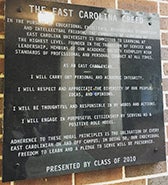 Each year the Dean of Students Office hosts the East Carolina Creed Recognition Ceremony. This event recognizes faculty, staff, and/or peers who exemplify the pillars of the Creed.
Each year the Dean of Students Office hosts the East Carolina Creed Recognition Ceremony. This event recognizes faculty, staff, and/or peers who exemplify the pillars of the Creed.
Think about who in the Pirate community displays integrity, diversity, responsibility, and citizenship.
Please take a few minutes to nominate a professor, a staff member, and/or a student for this prestigious honor. You may nominate only one individual for each pillar category. If you would like to nominate for more than one pillar, you may fill out the survey additional times once you have submitted each nomination. At the end of this survey, we ask you to provide your name and email address so we can invite you to participate in this ceremony if your nomination is chosen.
Deadline for nominations is March 10th, 2017. The Recognition Ceremony will be held on Thursday, March 30 at 5:30pm in Harvey Hall, with Creed Week being held on campus April 3rd-7th.
Greek Life Staffing Changes
 As of February 1, Keith Tingley transitioned to the Office of Student Affairs Development and became the Senior Associate Director of Engagement & Special Projects, focused on corporate sponsorships, affinity groups, and individual gifts for the division. Keith, an ECU alumnus, served as the Greek Life director for six years and worked in the department for over 10 years. Greek Life – a unit of Student Involvement & Leadership (SIL), will begin a national search for the director’s position immediately. Prior to joining East Carolina, Keith worked for four years managing regional and local sales accounts for WNCT-TV in Greenville, NC.
As of February 1, Keith Tingley transitioned to the Office of Student Affairs Development and became the Senior Associate Director of Engagement & Special Projects, focused on corporate sponsorships, affinity groups, and individual gifts for the division. Keith, an ECU alumnus, served as the Greek Life director for six years and worked in the department for over 10 years. Greek Life – a unit of Student Involvement & Leadership (SIL), will begin a national search for the director’s position immediately. Prior to joining East Carolina, Keith worked for four years managing regional and local sales accounts for WNCT-TV in Greenville, NC.
In addition, also in February, Karen Clegg, Assistant Director in the Department of Greek Life, left ECU as she accepted a position at the University of Washington. Karen served as the Panhellenic Council advisor at ECU for over six years and returned to her alma mater, the University of Washington, as an Assistant Director in the Office of Fraternity & Sorority Life. The assistant director position search will begin shortly after the director’s search.
Dorothea Mack, current Assistant Director of the Department of Greek Life – advisor to NPHC and the Multicultural Greek Council, will serve as the interim director. Jess Turuc, current Assistant Director of the Department of Greek Life – advisor to IFC, along with a new support position will assist Dorothea in supporting ECU’s Greek community.
For any questions, contact Erik Kneubuehl, Associate Vice Chancellor for Student Involvement & Leadership.
ECU and Campus Living Leaders Featured in UNC GA Article
“Living Learning Communities – Living with the Like Minded”
by: Phillip Ramati
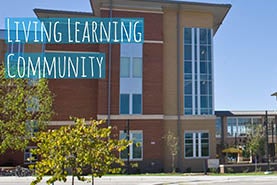 For those attending a university for the first time or transferring to a new campus, getting acclimated to the environment can often be the biggest hurdle a new student must clear.
For those attending a university for the first time or transferring to a new campus, getting acclimated to the environment can often be the biggest hurdle a new student must clear.
Proximity and access to like-minded individuals who share the same majors or interests could prove beneficial academically and socially.That’s the theory behind living learning communities, also known as residential learning communities, which have been a growing trend across the country for well over a decade. On the University of North Carolina campuses, the number of living learning communities as well as their variety have also seen significant increases.
Created mostly for freshmen or transfer students, newcomers to a UNC campus can register to live in student housing with specific themes. Some communities are based around academics – such as living with fellow chemistry majors or fine arts students; some are based around the unique challenges facing students from similar backgrounds; and some are built on themes such as leadership, honors studies, athletics or environmental awareness.
East Carolina University Provost Ron Mitchelson said his campus has seen “exponential growth” of the learning communities since it opened its first one in 2009. Now, there are 17 on campus with plans to add even more. Mitchelson notes that placing students among like-minded classmates can have advantages, particularly with first-generation university students, whose parents have no college experience to share with them.
“You are enrolling a group of students who are similar in their pre-conditions in entering the university and letting them support one another to see what this university setting is all about,” he said. “That’s the real advantage. There’s an affinity, a cohesiveness that drives them from the pre-conditions.”
William McCartney, associate vice chancellor of campus living at ECU, said about 20 percent of first-year students – freshmen and transfers – reside in a living learning community, representing more than 800 students. Ultimately, the university hopes to raise the number to 25 percent as more communities are developed.
According to McCartney, the living learning communities have evolved significantly since he first arrived. When ECU started the program, it was simply a group of students from the same academic discipline living together. As the program has grown, the communities now get funding and work with academic departments for coursework and programming.
The results have paid off. The average GPA among living learning community residents (not counting the honors village) is 3.0, compared to about a 2.7 among all ECU freshmen.
Greenville Fire and Rescue Training at CRW Facility
Article by: Beth Velliquette with the Daily Reflector
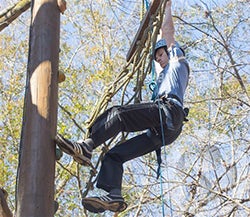 In January, new firefighters/EMTs from Greenville Fire/Rescue trained at the Campus Recreation and Wellness ropes course.
In January, new firefighters/EMTs from Greenville Fire/Rescue trained at the Campus Recreation and Wellness ropes course.

